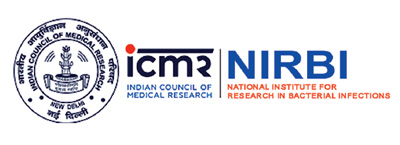ICMR - National Institute for Research
in Bacterial Infections
आईसीएमआर - राष्ट्रीय जीवाणु संक्रमण अनुसंधान संस्थान
Department of Health Research, Ministry of Health and Family Welfare, Government of India
स्वास्थ्य अनुसंधान विभाग, स्वास्थ्य और परिवार कल्याण मंत्रालय, भारत सरकार
WHO Collaborating Centre For Research and Training On Diarrhoeal Diseases
Division
Bacteriology

The Division of Bacteriology plays a crucial role in various
research activities related to enteric and blood-borne
pathogens. Our priority areas of research include generating
evidence on AMR, studying the molecular epidemiology of the
pathogens, and developing diagnostics to create sustainable
prevention strategies. These efforts align with the World Health
Organization's (WHO) mission to combat AMR in human health by
2030.
National Repository of Antimicrobial Bacteria (NRAMRB), a
facility under the “AMR hub,” has been established to address
AMR research across India (https://nramrb.org.in). This is a
state-of-the-art facility at the national level where
representative bacterial strains with antimicrobial resistance
profiles and genome information are available. This is a valued
source for obtaining well-characterized strains for researchers
in academia and commercial entities. The Division also maintains
a large collection of well-characterized bacterial
enteropathogens and contributes significantly to enteric disease
research in India.
The clinical bacteriology laboratory of the Division has been
accredited by the National Accreditation Board for Testing and
Calibration Laboratories (NABL) as per ISO 15189:2012 ''Medical
laboratories - Requirements for quality and competence'' since
2016. The scope included culture, identification and antibiotic
susceptibility testing of the organisms from blood, stool, and
rectal swabs, along with Widal test from serum. This laboratory
has also been listed as a WHO Pre-Qualification Evaluating
Laboratory for the analyte V. cholerae antigen since 2019.
The division is equipped with state-of-the-art equipment
facilities. The Division’s multifaceted research include
isolating, identifying, and characterizing enteric and
septicemic pathogens from the hospital/ community through
systematic surveillance, supporting vaccine trials,
confirmation, and serotyping. Outer membrane vesicle-based
non-replicating candidate vaccines against Shigella and
Salmonella infections have been developed in the Division and
patented. These candidate vaccines showed promising results when
tested in appropriate animal models. The Division's scientist
works on Helicobacter pylori and extensively characterizes the
pathogen at the molecular level in samples collected from
duodenal ulcer patients and asymptomatic individuals. Division
scientists undertake diarrheal outbreak investigations to
analyze the etiology and support health authorities in
implementing containment measures in minimal time.
The Vibrio phage reference Laboratory of the Division developed
phage-typing schemes for V. cholerae O1 and characterized V.
cholerae O139 phages. Primary ongoing activities include
isolating, characterizing, and implementing phages for typing
bacterial strains. Research on developing lytic phage cocktails
with potential therapeutic use is ongoing. Successful
implementation of phage cocktail-based therapeutics will have
tremendous value for treating infections caused by multidrug-resistant
bacteria.
The division organizes training programs on conventional
microbiology and molecular typing at national and international
levels, with support from ICMR. Specialized training is also
conducted with support from the World Health Organization (WHO).
ICMR primarily supports the Division's ongoing research
activities. The Division receives extramural funding from
national and international organizations, such as the Department
of Biotechnology, Govt. of India, Council of Scientific
Industrial Research, Govt. of India, the Japan Initiative for
Global Research Network on Infectious Diseases (J-GRID), the
Ministry of Education, Culture, Sports, Science and Technology
in Japan, and the Japan Agency for Medical Research and
Development (AMED) through Okayama University, Japan; Funding
from the National Institute of Infectious Diseases (NIID),
Tokyo, Japan.


